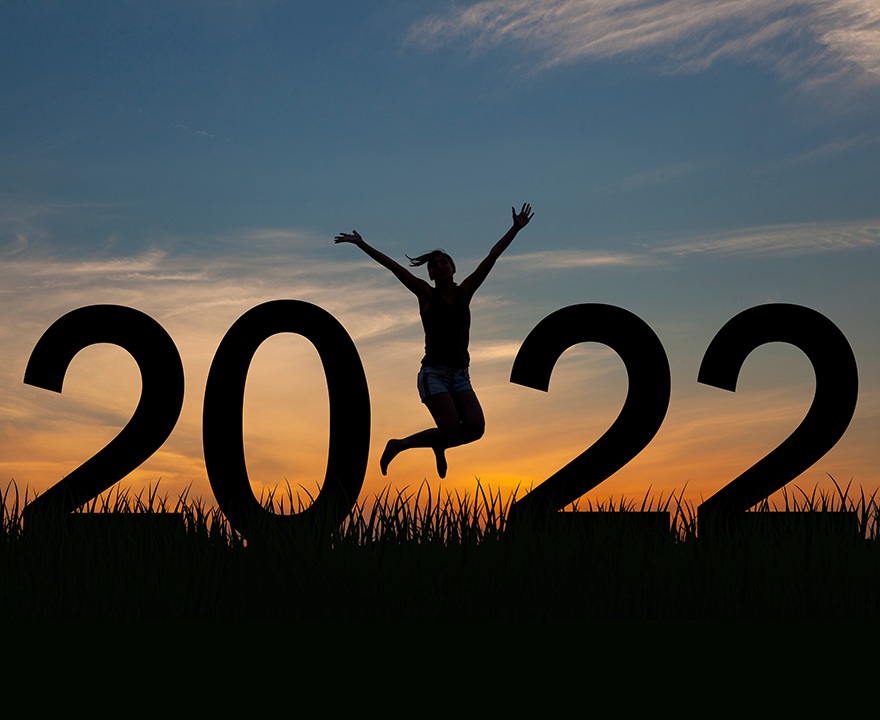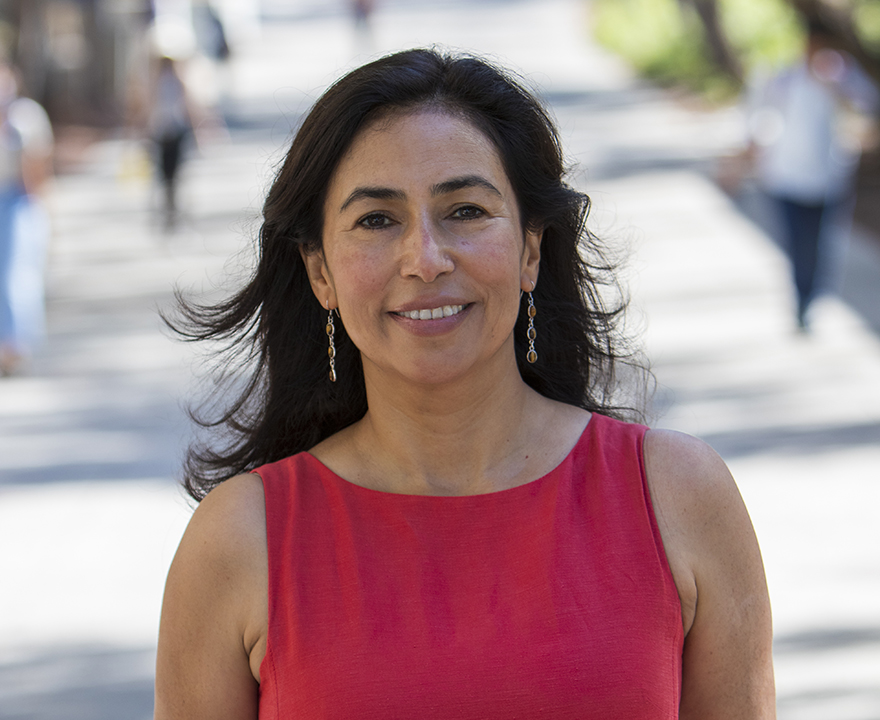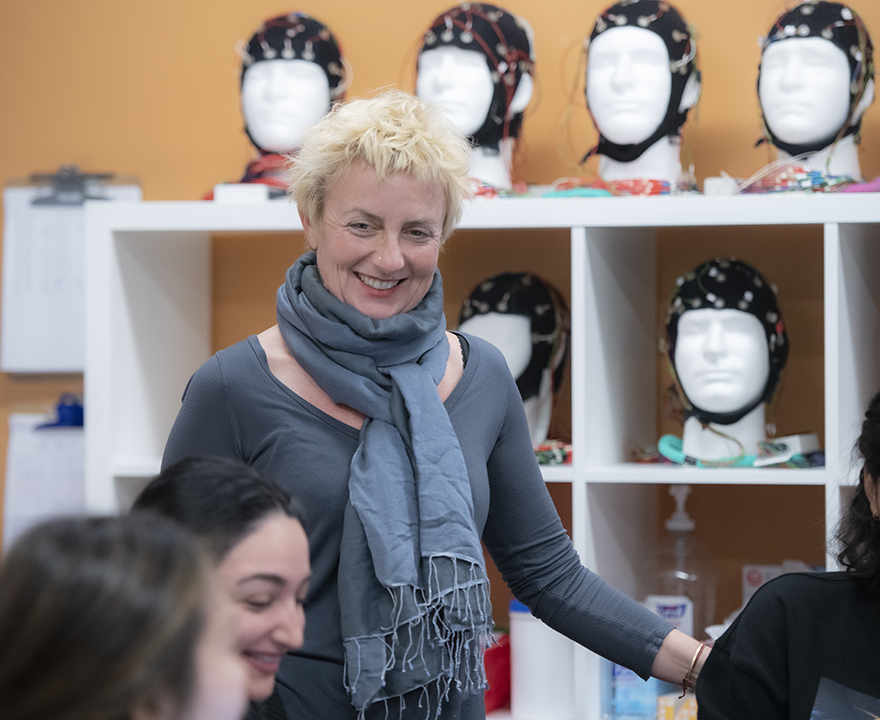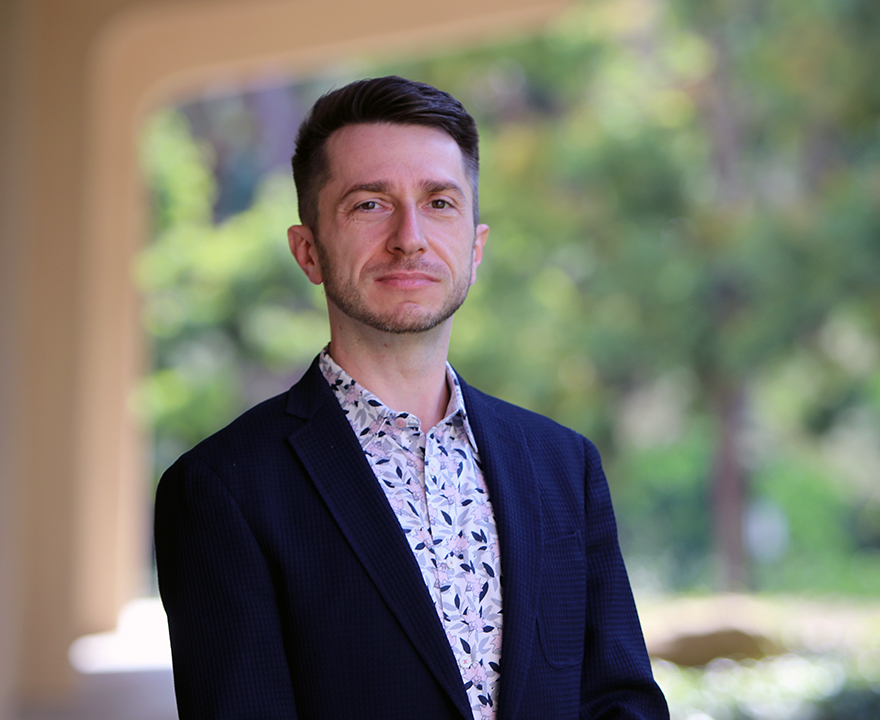
Looking to start fresh in the new year?
It's a new year and with it comes the ritual of resolutions. For those still looking for ideas, we asked a trio of UCI social scientists to weigh in with research-backed life hacks for making meaningful improvements in 2022. Their insight below covers everything from the power of practicing positivity and getting more shut eye to setting realistic goals and understanding the role technology plays in your everyday decisions and more.
 On happiness and how to cultivate and practice positivity
On happiness and how to cultivate and practice positivity
Belinda Campos, Professor and Chair, Chicano/Latino Studies
My work has focused on studying factors and processes that characterize high quality relationships, including positive emotions and their expressive displays. A key question I have sought to answer is whether sociocultural contexts that emphasize prioritizing others before the personal desires of the self – as is commonly done in Latino and East Asian cultures – shape relationships in ways that benefit psychological and physical health.
One thing about positive emotions is that they are rewarding in their own right. They feel good – whether we are doing something fun and exciting, celebrating a major achievement, or sharing a giggle with a loved one. Of course we want more of that!
For happiness, consider the following three positive emotion pathways:
- Capitalize on the good. When someone shares good news, even small things, respond with active constructive enthusiasm. This is a key way to increase your joy, bring joy to others, and have a moment of shared joy!
- Engage with others, take interest and express interest. Interest is sparked when we feel something is novel and challenging but the challenge is manageable (as opposed to overwhelming). This probably played role in why people took up baking during the pandemic; it was an interesting way to stay occupied and develop new skills.
- Remind yourself of the things you have to be thankful for and express appreciation to others. These small moments of appreciation feel good and strengthen relationships.
My suggestions emphasize focusing on others more than the self; that's consistent with evidence that focusing on others can be really good for us. Positive emotions are part of what helps us to put others before the self and doing things for others, and with others, feels good. People report levels of higher well-being when they're giving to others. Simply put, focusing on others in a prosocial way is one clear path to happiness.
Last but not least: Finding ways to have more positive emotion is good; positive emotions are important un-doers of negative emotion. They help us recover faster from the negative and that’s so important during these hard times. That said, you want to leave room for all the emotions. Cultivating and practicing positive emotions does not mean striving to only have positive emotions; that’s not possible and as a goal it can do more harm than good. But make space for the positive and let it help manage and get you through the negative.
 On getting sleep and its importance in overall health
On getting sleep and its importance in overall health
Sara Mednick, Professor, Cognitive Sciences
My work has focused heavily on the science of sleep: how it impacts memory, how interventions like pharmacology and electrical brain stimulation can be used to improve it, and how sex and age can help or hinder it. In my forth coming book, The Power of the Downstate, I offer a number of action items and sleep tips for feeling revitalized each morning. A few include:
- Get to bed early. The most restorative sleep comes at the beginning of the night, and if you go to sleep too late you can miss out on its benefits. Therefore, my first recommendation is to get to bed by 10 p.m. This allows your brain a solid period of time in deep sleep, which is important for cleaning out toxins that - left unchecked - can develop into plaques associated with dementia and Alzheimer’s disease. This period also helps maximize and strengthen long-term memories.
- Be consistent. The second recommendation is to embrace consistency in your sleep patterns. Your body and mind work best when you maintain consistent habits for eating, exercise, and sleeping. So, choose an hour of the night for your bedtime (e.g., 10-11 p.m.) that you can stick with on the weekdays and the weekends. In time, your body and mind will learn that this is when sleep happens, making it easier for you to fall asleep. At the end of the day, the goal is to tell your brain that it’s time to wind down.
- Use your resources. Light is an important resource, so use it wisely. You can set up blue light blockers all around you, starting with computer filters, or blue light–blocking filters on your glasses or even contact lenses. Your phones and computers offer light filtering options, but their ability to affect your circadian rhythm have yet to be realized and they may just give you a false sense of security promoting more screen time. If you use them, program them to turn on at 6 p.m. and stay on until morning. While you are at it, set up the Do Not Disturb feature on your phone to stop with the bells and whistles for the same period of time. A few other fun ways to induce sleep include taking a stroll at dusk in an area where you will be exposed to later afternoon/early evening natural light; dining by fireside; lighting candles for your evening ablutions; and doing your best Corey Hart impersonation by wearing your sunglasses at night in any sort of fluorescent hellscape, from your local gas station/convenience store to the hotel lobby you just entered at 10 p.m. after a long day of travel.
 On setting realistic goals, leaning on your networks, and getting a handle on finances
and AI
On setting realistic goals, leaning on your networks, and getting a handle on finances
and AI
Matthew Harding, Professor, Economics
Many of us start the new year by committing to (and soon after) failing to stick to our resolutions. Our resolutions are often about making better choices in our life. “This year I will eat healthier, I will save more, I will learn a new skill!” So why do we so often fail at this? There are three main reasons why this happens. First, we are often beguiled by resolutions that are broadly speaking true (and we learnt about it on TikTok) but are not particularly well suited to us. Second, we may lack the knowledge or skill to successfully implement them. Third, we are likely to get too excited about turning a page in our life and make resolutions that are overly optimistic and frankly quite unrealistic in our specific circumstances. These three factors are often intertwined and explain we don’t always make better or healthier choices even when we have the best intentions! So, what should we do to make better choices?
- Choose realistic goals. My research shows that when choosing goals, people tend to fall into distinct groups. Only a small group of people chooses a realistic goal given their unique set of constraints or the physical reality of how the world works. Those people tend to also stick to their goals. While their enthusiasm diminishes over time (we call this the “honeymoon effect), they will largely change their behavior to make the lifestyle choice permanent. In contrast, most other people tend to be wildly optimistic about what they can achieve. In fact, it is common to see people committing to things are not just unrealistic but completely impossible. In one example we showed that people promise to save way more electricity than they have ever consumed! There are many reasons why we often set expectations that cannot possibly be met. As humans we tend to often focus on outliers. We spend a disproportionate amount of time following successful CEOs on Twitter flying into space on oddly shaped rockets. Is that going to be us one day? Extremely unlikely. We would make much better choices focusing on the mean experience of people like us. And since people like us are more likely to be our friends and family …
- Invest in your social networks. If there is one thing that the pandemic has taught us, it’s that we are all interconnected and networks matter (for a good introduction, check out Blueprint: The Evolutionary Origins of a Good Society by Nicholas A. Christakis, M.D, Ph.D.).A new virus exploited the interconnectedness of today’s world to go from one city in China to every known corner of the world within weeks or months. The economy is struggling as supply chains are strained leading to shortages ranging from microchips to auto parts and Philadelphia cream cheese. At the same time, we depend on social networks more than ever. We need our friends and families to help us through tough times. In addition to the covid pandemic, the world is also facing a pandemic of isolation and fear. Strengthen the networks you have and build new ties. It can be challenging to reach out in a world where every sneeze is viewed with suspicion, and we live in increasingly polarized bubbles. Social media when used in moderation can help. And it is often the only way to form connections. Imagine what it must be like to be a gay youth in a small town in Russia when you are afraid to be yourself every single day. This is a good time for all of us to be grateful for the connections that we have and invest in new ones.
- Worry about economists worrying about inflation. Most of us would rather not spend too much time worrying about macroeconomics. But the world faces unprecedented uncertainty which makes planning very difficult for policy makers, businesses, and households alike. Omicron is not the last variant and history is a rather depressing guide when it comes to pandemics. (The Antonine Plague of 165 AD lasted 15 years.) Inflation has reached levels not seen in 40 years and most of us have no experience navigating such an environment. Economists are struggling to make predictions because so many variables are constantly changing. We don’t know yet how policy makers will respond (not much so far), how labor shortages will affect workers’ abilities to bargain for higher wages, or how quickly supply chains will be restored. What we do know is that prices for now will increase and so will interest rates. This requires all of us to be more mindful of everyday economic decisions. This might mean economizing when shopping at the supermarket or turning off the lights (this helps conserve energy and is good for the environment too!). Meat and beef in particular is increasingly expensive and accounts for nearly 60% of all greenhouse gases from food production. This is a good time to invest in a vegetarian cookbook (and learn how to cook if you don’t already know)! And since we are also talking about interest rates this is a good time to also worry about your debt, especially credit cards, short-term loans and anything with an adjustable interest rate. As a first step you might want to re-learn how the compounding interest rate works. It is key to understanding how much to save for retirement but also essential to avoiding debt traps. Learn to stay away from high interest debt that accumulates over time and don’t use more debt to refinance existing debt thus getting caught in a debt spiral. An economist’s usual advice is to save, save, save. But since according to some estimates the average risk of dying in the U.S. is now higher than that faced by extreme fishermen (the riskiest profession apparently), you may also want to spend (cautiously) now. We are told that experiences are more meaningful than things so it might be a good time to also spend on experiences that you can share with family and friends.
- One last thing, contemplate free will. The new year will undoubtedly bring more technical marvels as the reach of artificial intelligence expands across all domains of life. AI is fundamentally a tool for making predictions about all aspects of our existence - from what movies we like to watch to how well we will manage our mortgage and how our health is progressing. These are sometimes interlinked, and recent research shows that your credit score can predict when you are going to die. AI is very good at extracting private information about us that we might prefer to keep hidden from the world. This also opens an interesting philosophical question: If AI can predict the future so very well, is it then really up to us or is the world fundamentally pre-determined by a constant stream of cause and effect with very little or no opportunity for true freedom? Keep also in mind that by predicting what ad you would like to see, an AI also re-shuffles your Google search results thus making it more likely that you do click on a link and ultimately buy the product the AI predicted you would. A prediction thus becomes a self-fulling prophesy that shapes your reality. So this might also be a good time to turn off your devices, take a deep breath and think about your values as you contemplate making better choices in the new year.


